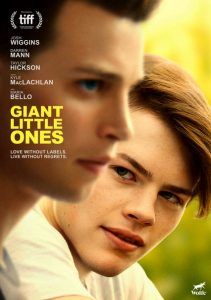Giant Little Ones-2019
Director Keith Behrman
Starring Josh Wiggins, Darren Mann
Scott’s Review #1,000
Reviewed March 13, 2020
Grade: B+
Giant Little Ones (2019) is an independent LGBTQ film about both coming to terms with one’s sexuality and accepting and embracing other people for whom they love, and how they wish to spend their life.
It’s an honest and resilient coming-of-age story, most reminiscent (but rawer) of the recent Love, Simon (2018), told from a teenager’s perspective and the pressures and emotions of youth.
The subject matter has been explored to death in cinema, but there is still something fresh and meaningful that is offered.
High school chums Franky Winter (Josh Wiggins) and Ballas Kohl (Darren Mann) have been best friends since diapers. They joke around, go bike-riding, and knock back a six-pack together.
They are handsome, integral parts of the swim team, and popular with girls. Each has a steady girlfriend with who they anticipate soon going all the way. Any teenage girl would love to trade their life with the boys.
On the night of Franky’s seventeenth birthday party, Franky and Ballas get drunk together and spend the night crashing in the same bed. An unclear incident of a sexual nature occurs, altering and damaging their friendship.
Each boy has one sister and a set of parents, but Franky’s are more prominent, with a story of their own. His father, Ray (Kyle MacLachlan) divorced Franky’s mother, Carly (Mario Bello) after coming to terms with being gay.
While the focal point is on the teenage set, and Franky more than Ballas, it’s nice to see parents in these types of films with more to do than just pour coffee or offer unheeded advice.
MacLachlan and Bello are fascinating to watch, carefully distant from each other, but also have mutual respect. Both characters’ struggles are pointed out by Carly angrily lashing out that Ray was certainly not gay when she married him; Ray experiences guilt at wounding Franky emotionally.
The film is careful, admiringly so, to include two high school students who are already outwardly gay. The characters are not ridiculed or repressed, and one, Franky’s best friend Mouse (Niamh Wilson), is assumed to be slowly coming to terms with being transgender.
The other is a popular boy on the swim team. These representations are strong, though both characters face some level of opposition, so their plights are not easy.
The most heartfelt and poignant scene is when Franky and Ray reconnect as father and son in a treasured dialogue, where Ray explains how he met his partner. The beautiful moment blossoms because it’s Franky who asks Ray how he and his partner met.
Any LGBTQ person can attest to the powerful and heartwarming moment when they are asked about their significant other. The proud look in Ray’s eyes and the quiet cadence with which he carefully warns Franky not to label himself, but rather stick with those he connects to, is lovely and sentimental.
I like how Giant Little Ones is not a love story between the two boys and ambiguous is not only whether their friendship can be fixed, but whether one or both is gay, bi-sexual, curious, or merely experimenting with their sexuality.
The film avoids labels and boasts no clear-cut angle, steering clear of anything too preachy or defined. This supports its overall point.
A minor criticism is that, despite the boys being best friends and on equal footing, Franky becomes the central character, while Ballas is not explored thoroughly. Ballas borders on sociopathic behavior and has a ton of anger, but why? Is it only his sexuality?
The character remains mostly a mystery, and I was eager to learn more about him and what drives him.
Giant Little Ones (2019) is a heartfelt and intimate coming-of-age story about friendship, self-discovery, and the power of love without labels. The young actors are all natural, believable, and earnest, and the seasoned supporting cast lends credibility to a tiny, low-budget picture.
The LGBTQ community will embrace this film, while anyone else will be touched by its honesty and poignancy.
